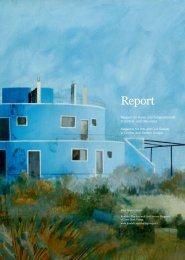Report_Issue 1/2009 - Jubiläum/ 20 Jahre Mauerfall
Report_Issue 1/2009 - Jubiläum/ 20 Jahre Mauerfall
Report_Issue 1/2009 - Jubiläum/ 20 Jahre Mauerfall
Sie wollen auch ein ePaper? Erhöhen Sie die Reichweite Ihrer Titel.
YUMPU macht aus Druck-PDFs automatisch weboptimierte ePaper, die Google liebt.
Jewgenija Albaz is one of those journalists in Russia who, like Anna Politkovskaya, her former colleague from her student<br />
days, places her finger on the wounds of the state and its regime. During the era of the Soviet Union she conducted<br />
research into the KGB for which she received a number of threats. Albaz still receives threats and is on the “death lists”<br />
of various groups on the Internet. She chairs a political discussion on the liberal radio station “Echo Moskvy” and is<br />
editor-in-chief of the weekly magazine “The New Times”. In an interview with “<strong>Report</strong>” she offers insights into the everyday<br />
world of a journalist in an authoritarian state, in which human rights are of little account and representatives of the<br />
media can die for presenting the unvarnished truth.<br />
— Eduard Steiner talks to Jewgenija Albaz —<br />
Gussinski, then that’s called oligarchic. Why,<br />
actually? Where does this distortion in Western<br />
perception come from? Where do you in the<br />
West get your convictions about how good and<br />
honest journalism should be practiced? Perhaps<br />
in fact it is the case that you in the West<br />
could learn something from us. Forgive my impertinence:<br />
I haven’t seen much investigative<br />
work of any quality carried out in the West. In<br />
contrast we have carried out this kind of work.<br />
I meant the pluralism of the Nineties. Surely<br />
it was to an extent an “oligarchic” pluralism,<br />
which, due to the current Putin regime, is in my<br />
opinion somewhat glorified.<br />
Of course in the 1990s there were restrictions on<br />
freedom of expression but, due to the fact that<br />
the media belonged to different business structures,<br />
despite influence being exerted pluralism<br />
was preserved. At that time the State owned<br />
less than 34 per cent of the media throughout<br />
the country, today the figure is 98 per cent. One<br />
should not brand Russian oligarchy capitalism<br />
to such an extent, these kinds of things existed<br />
in many countries in the world. We still have<br />
monopolies today: “General Motors” or the<br />
“Times Corporation” in the USA. Each of them<br />
defends their interests aggressively. In Russia,<br />
where there is a complete lack of any form of<br />
civil society this kind of capitalism has taken on<br />
a more hideous form. But journalism has not<br />
ceased to be journalism just because of this.<br />
And today?<br />
Today the directors of the television channels<br />
and the newspapers are invited every Thursday<br />
into the Kremlin office of the deputy head of<br />
administration, Vladislav Surkov to learn what<br />
news should be presented, and where. Journalists<br />
are bought with enormous salaries. In<br />
discussions they tell us then how horrible it is<br />
to work in the state television service. All channels<br />
of Russian television aim at telling people<br />
incessantly: “Don’t worry, be happy.” Don’t get<br />
upset, laugh, make a joke and don’t think about<br />
the problems that confront you! Nevertheless,<br />
people feel that these are lies because in real<br />
life they see that prices and the crime rate are<br />
rising, to the same extent as the bribery money<br />
that “business” pays to civil servants. They see<br />
that their rights are being infringed. We experienced<br />
all of this already under Soviet rule. We<br />
have already built up a developed socialism.<br />
You must understand the fact that we have immense<br />
experience. We have a fantastic ability to<br />
survive. We can (unfortunately) live without all<br />
of that.<br />
“Where do you in the West<br />
get your convictions about<br />
how good and honest journalism<br />
should be practiced?”<br />
The number of listeners to your station “Echo<br />
Moskvy” in <strong>20</strong>06 rose to the respectable figure<br />
of 600,000.<br />
Hardly surprising, people are sick and tired of<br />
propaganda. In every ministry, in the Kremlin<br />
and in the government “Echo Moskvy” is played<br />
the whole time, because they are craving for<br />
information. Recently I held a two-hour programme<br />
with the theme “civil society”. I asked<br />
the listeners whom they trust more: the state<br />
or the institutions of the civil society? 95.6 per<br />
cent answered in favour of the civil society. And<br />
this despite that on all channels people are told<br />
about the wonderful President Putin, the father<br />
of the people and the great brother who solves<br />
all their problems. People just don’t believe this<br />
any more.<br />
According to the „Center for Journalism in Extreme<br />
Situations“ in the last 15 years 315 journalists<br />
were murdered in Russia. Only a few of<br />
these cases have been solved. According to the<br />
ranking for press freedom of “<strong>Report</strong>ers Sans<br />
Frontières” Russia is on place 141 of a total of<br />
173 places.<br />
Jewgenija Albaz was born in 1958 in Moscow and studied<br />
there. During the Soviet era she began to investigate<br />
the KGB and in 1992 she produced her first book, which<br />
has been translated into German: “Geheimimperium<br />
KGB. Totengräber der Sowjetunion” (The Secret Empire<br />
of the KGB. The Grave Diggers of the Soviet Union).<br />
Around this time she was being published regularly in<br />
Western media such as “Spiegel” or the “Chicago Tribune”.<br />
From 1996 to <strong>20</strong>03 she published her investigative<br />
researches in the “Nowaja Gazeta” – the paper for<br />
which Anna Politkovskaya also worked until her death.<br />
Ms Albaz was awarded a masters degree in 1996 at<br />
Harvard University where she wrote her dissertation thesis<br />
on “Bureaucracy and the Russian Transformation” in<br />
<strong>20</strong>04. From <strong>20</strong>02 to <strong>20</strong>03 she taught in the USA at Yale<br />
University. She has received many awards in Russia, Europe<br />
and the USA for her journalistic work.<br />
Eduard Steiner lives and works in Moscow as GUS correspondent<br />
of “Die Presse”.<br />
Published in “<strong>Report</strong>” 1/<strong>20</strong>07<br />
33




